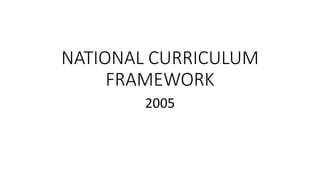
NATIONAL CURRICULUM FRAMEWORK 2005
- 2. WHAT IS NCF? • A framework for developing syllabi, textbooks and teaching practices within the school education programs in India. • Main issues focused are educational purpose, educational experience, organization of experience and assessing learner. • Difference between Curriculum and Syllabus.
- 3. WHY NCF? • Yash Pal committee, Learning Without Burden learning has become a source of burden and stress on children and their parents. • Considering these problems, Executive committee of NCERT decided to revise the curriculum across all the schools in India.
- 4. GUIDING PRINCIPLES • Connecting knowledge to life outside the schools. • Ensuring learning shifts away from rote learning methods. (experiential learning) • Enriching curriculum to provide overall development of a student rather than textbook centric. • Nurturing democratic values enshrined in our constitution. (Equality, social justice, gender and caste etc)
- 5. • Universal Elementary Education • Sarva Shiksha Abhiyan (SSA): Aims to ensure five years of primary education for all in the age group of 6-14 by 2007 and eight years of schooling by 2010. • Respect the diversity in the socio-economic backgrounds including children’s native wisdom and knowledge.
- 6. LEARNING AND KNOWLEDGE • Primacy of Active learner – ‘Child-centered’ Pedagogy • Learners in Context Finding their voices, nurturing curiosity, pursuing investigation, sharing and integrating their knowledge. • Holistic approach to learning and development.(eg:living and non- living things) • Introduction of Common School System • Inclusive environment with flexible curriculum. • Constructive learning – Intelligent Guessing • In the name of Objectivity, flexibility and creativity is compromised. • Questions based learning.
- 7. • Using Play-way methods and activities, dilution of learning by giving things which are below their capability. • Involving local communities • Many schools have first generation school goers. Pedagogy must be reoriented when the child’s home provides any direct support for formal education.
- 8. CURRICULAR AREAS,SCHOOL STAGES AND ASSESSMENT LANGUAGE: • Importance of Home language or Mother tongue. • Multi lingual characteristic of Indian society poses complex challenges as well as range of opportunities. • 3 language Formula • Including Tribal languages in the curriculum. • Constitution states that a child should be provided with adequate facilities for instruction in mother-tongue in the primary stage of his education. • Sanskrit – Modern Indian Language.
- 9. MATHEMATICS: • A feeling of Fear and failure • Ability to think logically, formulate and handle abstractions. COMPUTER SCIENCE: • Technology use in domains of education in the fast changing world. • Challenges at Indian schools in attaining this.
- 10. SCIENCE: Basic criteria of validity of science curriculum • Cognitive – age appropriate and within cognitive reach of children • Content – must convey significant and scientifically correct content • Process – engaging learner in acquiring the methods and processes • Historical – be informed by a historical perspective(Newton’s law) • Environmental – considering environmental issues like pollution etc. • Ethical - promoting the values of honesty, objectivity, concern for others etc. At the primary stage, Science and Social science as ‘Environmental Sciences’, with health as an important component.
- 11. SOCIAL SCIENCES: • Focus on conceptual understanding rather than line up of facts to be memorized for examinations. • Critical reflection on social issues like poverty, child labor, illiteracy and caste and class inequalities etc. • Interdisciplinary approaches to promote key national concerns like gender issues, social justice, humanitarian rights and sensitivity to marginalized groups. • Civics should be recast as political science.
- 12. WORK: • From pre-primary stage to senior secondary stage, a pedagogy of work centric education.(Eg: Montessori system) • In order to acquire knowledge, develop values and multiple skills. ART: • Folk and classical forms of art and heritage facts should be introduced as integral components. • At every stage, art should be a subject.
- 13. PEACE: • Peace oriented values • Peace education in teacher education. HEALTH AND PHYSICAL EDUCATION: • For overall development improving fine and gross motor skills and coordination in team games. • Include Yoga HABITAT LEARNING: • Environment education in the form of issues and concerns.
- 14. ASSESSMENT: • Continuous and Comprehensive Evaluation • Primary stage, purely qualitative judgement and no test or examination instead assessment based on observations through everyday activities. • Formative and Summative Assessments • Term-end assessment weightage should be decreased. • Use of Open-ended questions and Open-book examinations • Progress Reports